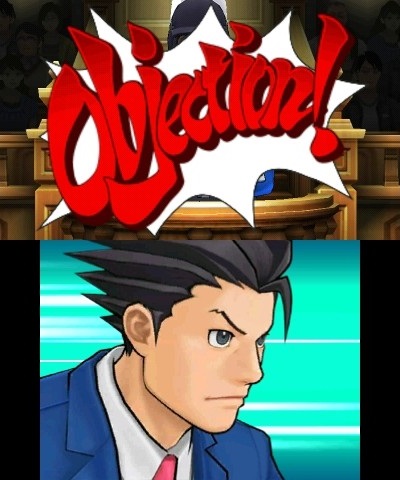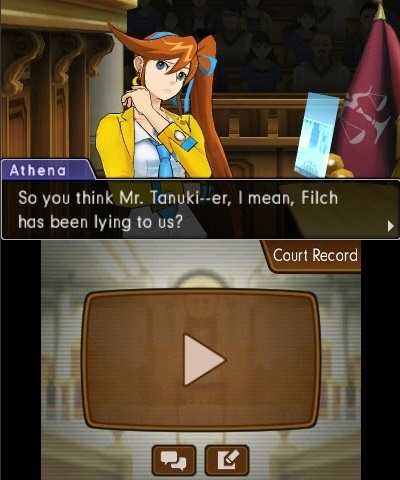No OBJECTION! to this one, folks.
If you think television programming as of late hasn’t been offering you enough procedural courtroom drama, HOLD IT! Phoenix Wright: Ace Attorney – Dual Destinies is here with not just a six-word title, but five court cases of pure craziness to keep you latched onto your 3DS for many hours. At its heart, PWAADD [Or "plaid" as said by Elmer Fudd. ~Ed. Nick] is not groundbreaking for the Phoenix Wright series, but it’s been a good nine years since Phoenix himself has donned an attorney badge for your amusement. Newcomers and hardcore fans will be fascinated, and some veterans may have spent enough time apart to enjoy this new entry, too.
The premise of PWAADD is simple: Three lawyers working for the Wright Anything Agency— Phoenix Wright, Apollo Justice, and Athena Cykes—mysteriously find their newly introduced friends and colleagues dropping dead around them and other newly introduced friends and colleagues taking the heat for the murders. Without so much as a single care about compensation to at least keep the lights on at the office, this mad trio takes their friends’ cases in court, attempting to free them and find the real culprit in one fell swoop. (Quick warning: If you’re a woman who holds even the smallest modicum of authority, don’t get to know these three lest you surrender your destiny to the cruel fate bound to these legal agents.)
In case that all sounds grim, you’d be surprised at how goofily it all plays out. The majority of characters have names that betray their personas or their professions, such as Ted Tonate, Phineas Filch, and Solomon Starbuck. And all their personalities are as stylized to match. Being that this is the first game on the 3DS, Capcom has finally utilized the upgraded hardware to present 3D character models for the series. While you won’t be panning a camera around anything, the cel-shaded characters all evoke just as much variety in their appearances as in the past but with a tad more oomph.
Speaking of 3D, this is one of the few games where I found the handheld’s 3D effect to be quite tasteful. Although the beautifully drawn and animated characters and scenery already demonstrate more depth and clarity than the DS entries, the 3D slider actually lends something to the graphical package. Even the anime cutscenes have 3D elements to them, but nothing is done obnoxiously to show off or disorient. When it got tiring on the eyes, I’d shut it off, but this is the first time I found myself occasionally putting it back on just to see.
Procedure for PWAADD is routine. After a ton of introductory reading and setups for the crimes, episodes break down into Investigation and Trial portions. During Investigation, the Wright Anything Agency lawyers interview related characters and examine crime scenes for clues, which can then be presented to characters for more information. These sections are interesting, but it quickly becomes apparent that you are being lead on a rather tight leash. Crime scene examinations and interviews end when someone says so, and Investigation sections are over when every task in the Notes area of your evidence has been checked off.
Trials are when you put all your evidence collection to the test, but of course, these are also forfeit to the format. Instead of freely deciding when to object or present evidence to contradict the prosecution, you wait for the game to present that opportunity to you, either by cross-examining a witness or during the various times when the lead lawyer on the case stalls for time and basically asks you what he or she is missing. In terms of reading comprehension, PWAADD serves as an excellent test of memory and attention, but its rigorous adherence to its canon ends up being very niche and potentially polarizing.

However, I do implore that if you’re new to the series, you should definitely give it a try. What the game lacks in, well, being "game-like," it makes up for in masterfully written cases of intrigue. Honestly, even considering all the ridiculous episodes of Law & Order (the later season) and CSI (all of it) I’ve watched, I never encountered such intricate chains of evidence, suspects, motives, and execution. The attention the writers have paid towards the details in each episode is worth of being called Rube Goldberg-esque with the highest compliments implied.
And though I poked fun at the characters’ zaniness and naming conventions, these qualities keep the game continually fresh and interesting. I know most of what transpires could never fly in a real courtroom, but it’s those moments of pure “What the heck is going on now?” that propel Phoenix Wright and his ilk into being worthwhile time sinks. When cross-examining the aforementioned Starbuck and pointing out the inconsistencies in his testimony, he starts acting like he’s in a crashing spaceship, pushing invisible buttons and even choking when his air tube dislodges. Another character, an artist studying to be a prosecutor, keeps pulling out pottery from the ether and smashing it on the ground in excitement, so much so that the judge asks him if he’s going to clean up all the shards before end of day.
What made the experience even more fulfilling was how the game makes you feel when you succeed at practically anything. When you counter suspicious testimony with mind-boggling evidence, characters reel as if slashed by a sword, the music ramps up, and the dialogue heatedly swings back and forth until the next revelation. It’s this kind of visual and aural reward that makes progression really feel like winning, even if there’s only one right answer to every question.
The confetti that falls when you clear your client and indict the real culprit is delicious icing on the gameplay cake, even if the culprit in each case is telegraphed so far in advance, it’s laughable. You won’t be surprised by whodunit, but you will be floored about how you get there. Although for most of the game, I was not emotionally invested in any of the characters, my feelings changed during the final episode, which had me practically biting my nails wondering how it would end. It’s worth noting that all the craziness sort of overshadows the fact that somebody died, an oddly dissonant approach to storytelling.

PWAADD only brings one new plot device to the table: Athena Cykes, a plucky lawyer fresh out of law school at the tender age of 18. Athena has the ability to hear discord in people’s words when they speak, sensing emotions that don’t match the words coming out of mouths. Using her tool, the Mood Matrix, Athena recreates witness testimony with flashing indicators of the emotions behind each sentence said. It is up to the player to determine which emotions don’t make sense, which exposes the witnesses and opens them up to more truth. These puzzles begin easily enough—why was she happy when the ceiling collapsed on her?—but eventually become much more challenging and more about discovering what you’re not seeing in the testimony as opposed to what you are.
Phoenix still maintains his Psyche Locks, and Apollo still has his nervous habit-spotting wristband, and a slew of characters from previous entries in the Phoenix Wright legacy come to visit, so hardcore fans, who are about a hundred years-old by now, will have plenty of treats in store for them. Other than that, the touch interface has been cleaned up and looks arguably nicer than older entries. Music is repetitive but barely noticeable. I sadly did experience two crashes, though, while trying to pull up the dialogue record. PWAADD doesn’t have an auto-save, but you can save at almost any point in the game, so I suggest doing so often. Otherwise, there were no other bugs, and hopefully, that will be fixed.
If you’re looking for some hot courtroom action, clinically insane characters, wild crime scenarios, and a lot of worthwhile reading, then Phoenix Wright: Ace Attorney – Dual Destinies is probably the niche game for you. Although it straddles the definition of “game” very loosely, it is an overall satisfying and sometimes exhilarating experience worth playing. Just don’t friend these guys on Facebook unless you have a death wish.
-
Fascinating, intricately woven court cases
-
Memorably crazy characters and courtroom antics
-
Lively graphics and decent 3D effect
-
New Mood Matrix ability
-
Tons of reading dialogue
-
Minimal gameplay or choice in actuality
-
Zaniness keeps compassion at bay
-
Culprits easy to guess way in advance







